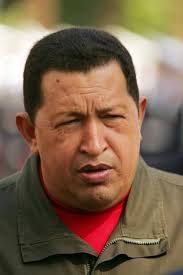Brandishing a photo of the plane, which he described as a P-3, Mr. Chávez said the overflight was the latest incursion in Venezuelan skies by the U.S. military from its bases on the Netherlands' Caribbean islands and from neighboring Colombia.The U.S. officials deny the allegations.
The Youtube video of Chavez's accusatory rant is below (in Spanish). If you watch just to the 50 second mark you will see the photo that he claims as his proof:
The problem is this photo can be found on the internet here and is reproduced below. It does indeed show a P-3C Orion U.S. Navy plane as he claimed, but the photo was taken in 1979. If you look closely at both pictures, you will see that the terrain below the plane is identical.
It is clear that Hugo Chavez is trying to distract the people in his country from the serious domestic problems they face. The Guri dam which supplies most of the country's electricity is operating at a fraction of its capacity due to the recent drought. Dan Molinski at the Wall Street Journal reports:
President Hugo Chávez, who won the presidency 11 years ago, in 2007 fully nationalized what was then an already heavily regulated and mostly state-run electricity sector. Over the years, the sector suffered from a dearth of investment despite sharply rising demand that was fueled by government subsidies that make electricity cheap.Chavez's recent devaluation of the Venezuelan bolivar has also sparked a lack of confidence in the government:
That has left Venezuela, which like most South American countries depends heavily on hydropower, vulnerable. Last year the country was beset by a drought. Water levels at the Guri Dam, which is one of the world's largest hydroelectric dams and supplies Venezuela with 73% of its electricity, have receded quickly. As a result, the government can't generate enough power to meet demand. Mr. Chávez's electricity minister, Angel Rodriguez, this week said the country is facing an "emergency situation."
The government has forced draconian electricity rationing on certain sectors, which could make matters worse for an economy already racked by recession. Critics say the socialist government is trying to snuff out capitalist-driven sectors with the rationing, while allowing government-favored industries in good standing to continue with business as usual.
Over the weekend, there were signs that Mr. Chávez's slashing of the "strong bolivar" currency could create as many problems as it solves in Venezuela's economy, provoking a wave of anxiety that sent Venezuelans scurrying to spend cash they feared could soon be worthless.
With the Venezuelan economy crumbling around him and his popularity sliding, I think it is reasonable to expect more theatrics from Chavez in the future.
.At Caracas's middle-class Sambil shopping mall, lines at cashiers reached 50-deep. Carmen Blanco, a 28-year-old accountant, waited to buy a 42-inch flat-screen television she doesn't need because she already has one at home.
"It doesn't make any sense to keep my savings," Ms. Blanco said Saturday, adding, "I'd love to see how things work in a normal country."
On Sunday, Mr. Chávez vowed to fight speculation and price increases that could result from the devaluation, which raises the price of imports. He is calling on the National Guard to be deployed on the streets to prevent speculators, but didn't offer specifics. He vowed to "seize any businesses and shops that are participating in speculation."
Harried by recession and sliding popularity, Mr. Chávez on Friday ordered the bolivar to weaken to 4.3 per dollar from 2.15 in a bid to shore up government finances that have been hit by weaker oil prices and to stimulate economic growth ahead of key elections.






No comments:
Post a Comment